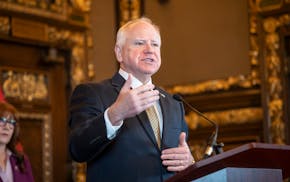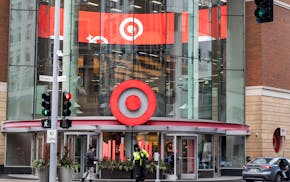Donaldson Co., the Bloomington-based company that clears $3 billion in revenue making industrial filters for vehicles, buildings, factories and even food, seems at first glance like the kind of global manufacturer vulnerable to tariffs and trade wars.
For decades, however, a key strategy at Donaldson has been building things in the markets where it sells them.
Donaldson has 65 plants around the world, and three-fourths of everything they make is consumed in the country that makes it. As a result, it ships relatively little from one part of the world to another.
"You hear a lot of companies say they have hundreds of millions of dollars' worth of tariff exposure. That's not where Donaldson is," CEO Tod Carpenter told me recently. "We have been able to, fortunately, pretty much offset all that is taking place. It's because of our operations and business model and the overall diversity in the company and the fact that we're very global."
Eighteen of its plants are in the U.S. Its largest is in Poland. Donaldson for decades has been a fixture among Minnesota's largest publicly traded companies. It ranks 20th this year on the Star Tribune 50 with about $3.6 billion in annual revenue.
Carpenter, who studied manufacturing technology in college, has been with Donaldson for 29 years, including the last 10 as CEO. Before joining the company, he spent 13 years at Hughes Aircraft Co., which became a part of Raytheon in the late 1990s.
I wrote recently that I was not worried about the place of American manufacturers in the world, a topic that has bubbled around the nation's consciousness for decades and seems to undergird President Donald Trump's trade policy. China has passed the U.S. in value of goods produced, but that doesn't seem surprising to me given its 4-to-1 population advantage. The U.S. is second in value of goods produced.
Carpenter made it clear he's not as sanguine about what's happening to U.S. manufacturers.
"American manufacturing has been pressured," he said.
"I come to that view from growing up through the 1960s and 1970s in Indiana, where my father was an hourly employee at a refinery and I remember all everybody ever wanted was to work hard and provide a better living for their children. And today we've become more of a service-based economy, and you don't see that same type of situation. It doesn't appear as though heavy service economies provide as many opportunities to the middle class as manufacturing does. So, it may be interesting that we're still No. 2, but we should still be No. 1 by far."
The big problem, he said, is that many companies moved production elsewhere in search of cheap labor, not just new business. Donaldson's international growth was shaped by following other multinational firms into new markets.
"If companies just grasped on to the way that Donaldson did it — if they said, 'OK, I'm going to that portion of the world when I have the volume because that's where the customer base is' — I think things would look very different‚" Carpenter said.
"We followed our major customer base, because they wanted us in their backyard," he added. "When we went into China, we went in on the backs of the multinationals, but then we grew in China on the backs of the [Chinese] nationals."
That's an easier proposition for a company like Donaldson that is always developing new products. The company's gross profit margin exceeds 30%, a reflection of its innovation and pricing power.
Donaldson conducts basic research on materials that can filter liquids and gases. For instance, while many people still think of Donaldson for the air-intake filters and mufflers used on trucks and heavy equipment, its R&D work has allowed it to enter the electric vehicle market with vents that allow for quick exhaust if pressure builds in EV batteries.
For companies that make or sell products that are commoditized, the only way to succeed is to continually wring out costs and improve productivity. Sometimes that has to be done in another place — and that's the thing that has upset Trump and others.
Carpenter said it's "not clear" how Trump's use of tariffs will work out.
"If you're going to try to protect a particular base in the United States, well, that's just what governments should do, right?" he said.
Like many business executives and investors, Carpenter is now watching more closely for whether the shock of the tariff policy will affect the rest of the economy. Donaldson can make some adjustments, but he suggested they may come with some pain.
"The concerning thing is the uncertainty across the business environment," he said. "To the degree that that has people pull back, you'll see some kind of a slowdown. We can flex with it, but it's not fun."

Ramstad: Gov. Walz, things are not getting done in Minnesota

Ramstad: AI is English-centric, but it's picking up Hmong quickly

Ramstad: Minneapolis' Camden neighborhood is rising. Houston White wants to keep it that way.

Ramstad: Minnesota's big businesses are in crisis with a common problem


